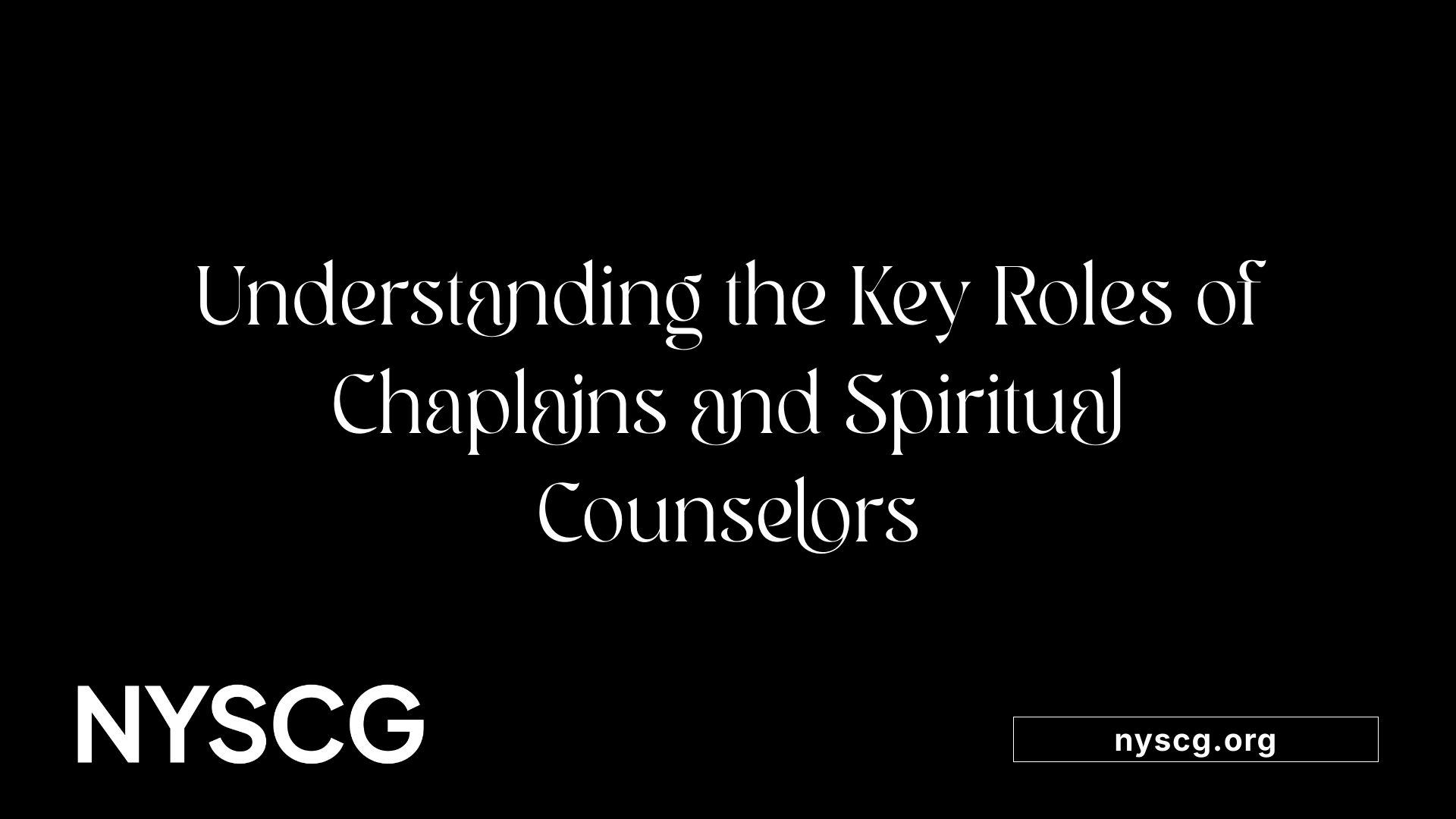Local Spiritual Counseling Roles for Chaplaincy Graduates


As communities grow increasingly diverse and interconnected, the need for qualified spiritual counselors and chaplains has never been greater. Graduates from specialized programs are positioned to serve in a variety of local settings, offering essential emotional and spiritual support to those navigating life's challenges. This article explores the core roles, educational pathways, career prospects, and the significance of interreligious and contemplative approaches in local spiritual counseling for chaplaincy graduates.

Chaplains and spiritual counselors play vital roles in supporting individuals through various life challenges and in different settings. Their primary responsibility is to provide emotional and spiritual support, guidance, and counseling tailored to each person's faith tradition or personal beliefs.
In diverse environments such as hospitals, prisons, military bases, or community centers, they facilitate religious rituals, ceremonies, and sacraments that are meaningful to those they serve. This can include conducting prayers, sacraments like baptisms or Eucharist, and memorial services, often in a non-denominational or interfaith context.
Supporting individuals during crises—such as illness, death, trauma, or incarceration—is central to their work. They help patients and families navigate complex emotional and spiritual decisions, offering comfort and reassurance.
Chaplains often work closely with healthcare teams, law enforcement, and social service agencies. They collaborate to ensure the holistic well-being of individuals, addressing emotional, spiritual, ethical, and moral concerns.
Another key role involves advocating for the spiritual needs and ethical considerations of their clients. They support spiritual development, mediate conflicts arising from religious or moral dilemmas, and promote understanding across different faiths or belief systems.
Moreover, they conduct spiritual assessments and crisis interventions, helping individuals find meaning and hope during difficult times. Their presence and counsel foster resilience, spiritual growth, and community connection, fulfilling a broad spectrum of care essential in many secular and religious settings.
To pursue a career in chaplaincy and spiritual care, individuals generally follow a comprehensive educational and training pathway. This begins with earning a bachelor’s degree in fields such as theology, religious studies, or related disciplines. Following this, a master’s degree—often a Master of Divinity (MDiv) or equivalent—is required, typically involving at least 30 semester hours of coursework focused on pastoral care, theology, and related subjects.
A crucial component of training involves completing Clinical Pastoral Education (CPE), which offers supervised clinical internships in settings like hospitals, prisons, or community agencies. These internships are accredited by organizations such as the Association for Clinical Pastoral Education (ACPE) and usually require multiple units—often four—to qualify for board certification as a Professional Chaplain. CPE develops practical skills and provides real-world experience essential for effective spiritual care.
Accreditation and certification are vital to ensure professional standards. Programs must meet ACPE accreditation standards to provide recognized CPE internships. Certification from professional organizations like the Association of Professional Chaplains or the National Association of Catholic Chaplains is often necessary to validate competence and facilitate career advancement.
Many programs today offer online and hybrid formats, providing flexibility for students balancing studies with personal or professional commitments. This approach makes engaging in accredited training more accessible, especially for those working in diverse geographic locations.
An inclusive approach is a hallmark of contemporary spiritual care training. Curricula are designed to be multifaith and culturally competent, preparing students to serve individuals from varied religious, spiritual, and secular backgrounds.
Coursework typically covers foundational topics such as the principles of spiritual care and counseling, managing grief and bereavement, mental health and healing, and cultural competency. This comprehensive education equips future chaplains and spiritual caregivers to support individuals facing crises like illness, trauma, or loss, in a manner respectful of their unique backgrounds and needs.
| Educational Element | Requirement | Additional Details |
|---|---|---|
| Bachelor’s Degree | Yes | In theology, religious studies, or related fields |
| Master’s Degree | Yes | Usually divinity, pastoral counseling, or theology, minimum 30 semester hours |
| Clinical Training | Yes | 4 units of ACPE-accredited CPE, total 400 hours |
| Certification | Yes | Through organizations like APC, NAC, or denominational endorsement |
| Program Format | Flexible | In-person, online, or hybrid options |
| Curriculum Focus | Broad | Foundations of spiritual care, grief, mental health, cultural competence |
Overall, the pathway into professional spiritual care combines formal education, extensive clinical training, and certification, ensuring practitioners are well-equipped to serve diverse populations across multiple settings.
 Chaplaincy offers a broad spectrum of career paths across various sectors, providing meaningful roles for those with specialized training. Graduates often find employment in hospitals, hospices, military deployments, correctional facilities, and academic institutions. In these settings, they serve full-time, offering spiritual counseling, emotional support, and pastoral care to individuals facing crises such as illness, trauma, or incarceration.
Chaplaincy offers a broad spectrum of career paths across various sectors, providing meaningful roles for those with specialized training. Graduates often find employment in hospitals, hospices, military deployments, correctional facilities, and academic institutions. In these settings, they serve full-time, offering spiritual counseling, emotional support, and pastoral care to individuals facing crises such as illness, trauma, or incarceration.
Beyond traditional institutions, there are emerging opportunities in community organizations, municipal agencies, and social services. Some chaplains work part-time or in volunteer capacities, reaching diverse populations, including those outside religious institutions.
Career advancement can include roles like certified chaplains, spiritual directors, program coordinators, or leaders within organizations. Leadership positions often require additional experience or certification, but can significantly impact the quality and reach of spiritual care services.
Networking and ongoing professional development are crucial for growth in this field. Organizations such as the Chaplaincy Innovation Lab and professional associations provide valuable resources, connections, and training opportunities. These help chaplains stay current with best practices and expand their influence.
| Sector | Typical Roles | Description | Additional Notes |
|---|---|---|---|
| Healthcare | Hospital Chaplain | Provides spiritual counseling to patients and staff | Requires clinical training and certification |
| Military | Defense Chaplain | Offers spiritual support to service members | Often involves deployment and resilience training |
| Corrections | Prison Chaplain | Addresses spiritual needs of inmates | May require specialized security clearances |
| Community | Faith-based Counselor | Serves in non-institutional community roles | Often volunteer or part-time |
| Education | Campus Chaplain | Supports student spiritual life | Usually part of student affairs |
Overall, diverse settings and roles await chaplaincy graduates. The pathway involves obtaining relevant degrees, completing supervised clinical training, and earning certification. These qualifications open doors to impactful careers where faith and service intersect, making chaplaincy a versatile and fulfilling profession.

Chaplaincy is a versatile field that serves people across many different environments. Beyond the well-known healthcare and military settings, chaplains are active in areas such as education, prisons, law enforcement, and community organizations.
In hospitals, hospices, and outpatient clinics, chaplains provide emotional and spiritual support to patients, families, and staff. They offer counseling, religious rites, and comfort during illness and recovery. In correctional facilities like prisons, jails, and detention centers, chaplains serve as spiritual guides and counselors for inmates and staff, helping with rehabilitation, moral support, and spiritual growth.
Military chaplains serve service members and their families, offering religious services, counseling, and moral guidance in often challenging environments. Law enforcement agencies and fire departments also employ chaplains to support first responders and manage crisis situations.
Educational institutions, including colleges and campus ministries, benefit from chaplaincy services that support student well-being and facilitate interfaith dialogue. Community organizations and social services utilize chaplains to assist individuals facing homelessness, addiction, or social adversity.
Recently, environmental, interfaith, and contemplative chaplaincy roles have gained attention. These chaplains focus on spiritual care in eco-activism, promote interreligious understanding, and lead contemplative practices that foster inner peace.
In each context, chaplains tailor their work to meet the specific spiritual needs of their populations. They conduct religious ceremonies, provide emotional support during crises, and facilitate dialogue among diverse spiritual traditions. With formal education, training, and credentials from recognized bodies, many chaplains serve as paid professionals, while others volunteer to serve their communities.
Overall, the scope of chaplaincy is broad, with roles adapted to the unique challenges faced by individuals in various institutional and community settings. Their work helps foster resilience, faith, and compassion across society.

Interreligious and contemplative chaplaincy programs significantly improve spiritual support by emphasizing inclusivity and cultural responsiveness. These programs train chaplains to competently serve individuals from a wide array of religious and spiritual traditions, respecting diverse belief systems.
A central element is the integration of contemplative practices like mindfulness, meditation, and silence, which bolster the chaplain’s ability to cultivate presence and empathy. Such practices help chaplains build a compassionate presence, vital when supporting those facing trauma, illness, or life crises.
Training incorporates working with complex social issues, including trauma recovery and earth-based spiritualities. This prepares chaplains to address a broad spectrum of needs across settings such as hospitals, prisons, and community centers.
Academic coursework, paired with experiential internships, often guided by organizations like the ACPE, provide real-world experience. Internships encompass 300-400 hours in settings such as hospices, jails, and eco-chaplaincy contexts. This immersive training focuses on developing skills to listen deeply, offer appropriate spiritual counsel, and foster hope.
The emphasis on interfaith dialogue and contemplative practice encourages ethical sensitivity, cultural competence, and a respectful approach to spiritual diversity. Overall, these programs strengthen the professionalism of chaplains, making them more effective in providing holistic, empathetic spiritual care.
| Aspect | Focus | Detail |
|---|---|---|
| Cultural Competency | Serving diverse populations | Open to students from multiple religious backgrounds |
| Practical Skills | Supporting trauma and social issues | Training includes handling crisis and earth-based traditions |
| Personal Development | Building presence | Techniques like meditation enhance empathy |
| Program Benefits | Enhancing accessibility | Prepares chaplains for complex or pluralistic settings |
| Certification Path | Professional recognition | Meets requirements for board certification and licensure |
Enhanced through partnerships with centers like the Center for Contemplative Chaplaincy, these programs exemplify how contemplative and interfaith training elevate the practice of spiritual caregiving, ensuring compassionate service across varied communities.

Educational pathways in spiritual care and chaplaincy are designed to equip students with both theoretical knowledge and practical skills. Programs like the MA in Spiritual Care and Counseling from JTS combine academic courses with experiential internships, such as Clinical Pastoral Education (CPE). These internships typically include dozens of hours of supervised clinical work in various settings like hospitals, prisons, and community agencies, giving students real-world experience.
Courses cover essential topics such as biblical principles, psychology, ethics, and cross-cultural understanding. For instance, classes on grief, trauma, and bereavement prepare students to support individuals through life's most difficult challenges. The curriculum emphasizes fostering compassion, character development, and cultural sensitivity, which are critical in providing effective spiritual care.
Many programs, including those offered online and in hybrid formats, focus on developing skills in crisis intervention, spiritual assessment, listening, and counseling. This training ensures graduates are ready to serve in diverse environments—from healthcare and military to social services and community organizations.
Students also learn the importance of maintaining ethical standards and the role of their own spiritual and emotional presence. Certification, such as board membership with organizations like the Association of Professional Chaplains, often requires completing accredited education and supervised clinical hours, ensuring readiness for professional responsibilities.
Understanding that many students are balancing ministry work or other commitments, these programs offer flexible online and hybrid courses. This flexibility allows students across various backgrounds and locations to pursue their certifications while gaining the necessary skills and experience.
After completing their education, graduates serve in multiple roles—including chaplain, spiritual counselor, or ministry leader. They work in hospitals, prisons, military environments, and community organizations, providing religious and emotional support.
These educational programs are designed not only to foster spiritual competence but also to develop personal capacity for empathy, leadership, and community impact. This comprehensive preparation ensures that graduates are capable of making a meaningful difference in the lives of those they serve.
As local communities become increasingly diverse, the role of qualified chaplains and spiritual counselors is vital in fostering understanding, resilience, and hope. Educational pathways such as the MA in Spiritual Care and Counseling and specialized programs from institutions like Naropa University and The Christian Leaders Institute prepare graduates to serve effectively across various sectors. Whether supporting individuals through personal crises, facilitating interfaith dialogue, or leading contemplative practices, these professionals contribute significantly to the spiritual and emotional well-being of their communities. By leveraging a combination of academic rigor, practical internships, and a commitment to inclusivity, chaplaincy graduates are equipped to address the unique needs of their neighbors, making meaningful impacts in local settings.
All you need is the will to make the world a better place.
New York State chaplain group inc. is a tax deductible organization with a federal tax Id number 92-383-4921